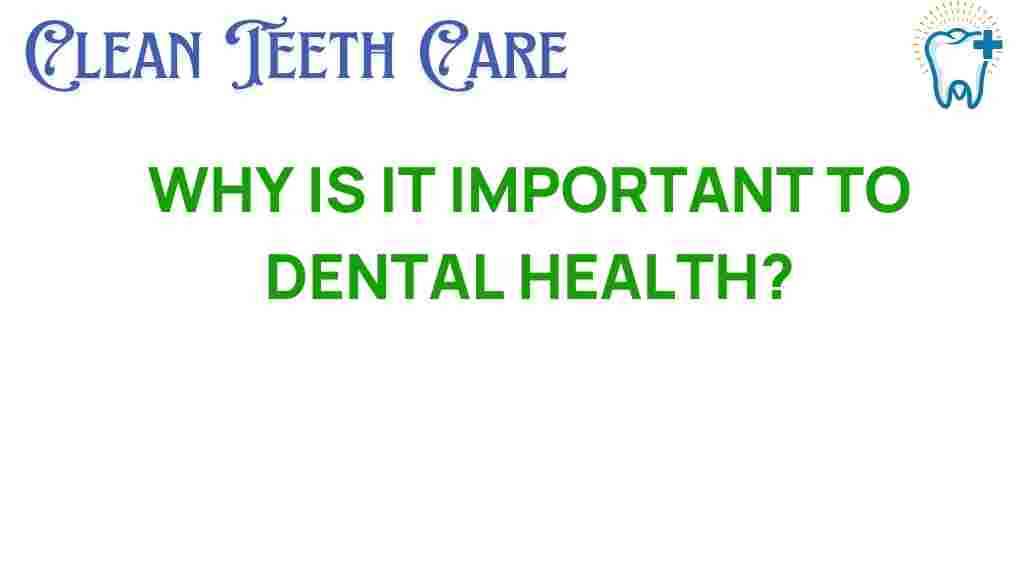Unveiling the Secrets: Why Dental Health Matters More Than You Think
Dental health is often overlooked in the grand scheme of personal health, yet it plays a vital role in our overall well-being. Many people underestimate the importance of oral hygiene, viewing it merely as a routine chore rather than a crucial aspect of health. This article will delve into the significance of dental health, exploring topics like cavity prevention, gum disease, and the importance of regular dental visits. By understanding these factors, you can maintain a healthy smile and ensure the longevity of your teeth.
The Importance of Dental Health
Dental health encompasses more than just the absence of cavities or gum disease; it is a reflection of our overall health. Poor dental hygiene can lead to various health issues, including:
- Heart disease
- Diabetes complications
- Respiratory infections
- Pregnancy complications
Maintaining good dental health is crucial for several reasons:
- Prevention of cavities: Regular dental care helps in the prevention of cavities, which can lead to more severe dental issues if left untreated.
- Gum disease prevention: Healthy gums are essential for the stability of your teeth and overall oral health.
- Confident smile: A healthy smile enhances your self-esteem and social interactions.
- Better overall health: Oral health is linked to your body’s overall health; maintaining it can prevent systemic issues.
Essential Practices for Oral Hygiene
To ensure optimal dental health, it’s essential to adopt a comprehensive oral hygiene routine. Here are the key components:
- Brushing: Brush your teeth at least twice a day with fluoride toothpaste. Make sure to use a soft-bristled toothbrush and replace it every three to four months.
- Flossing: Floss daily to remove plaque and food particles between your teeth where a toothbrush cannot reach.
- Mouthwash: Use an antibacterial mouthwash to help reduce plaque and prevent gum disease.
- Diet: Maintain a balanced diet and limit sugary snacks that can lead to cavities.
Cavity Prevention: Steps to a Healthier Smile
Cavities are one of the most common dental problems, especially among children. Here’s how you can prevent them:
- Regular dental visits: Schedule biannual check-ups with your dentist for cleanings and examinations.
- Sealants: Consider dental sealants for children’s teeth to provide an extra layer of protection against cavities.
- Fluoride treatments: Ask your dentist about fluoride treatments, which can strengthen enamel and prevent decay.
- Limit acidic beverages: Reduce consumption of soda, fruit juices, and other acidic drinks that can erode tooth enamel.
Understanding Gum Disease
Gum disease, also known as periodontal disease, can lead to serious complications if not addressed. It starts with gingivitis, which is the inflammation of the gums, and can progress to periodontitis, resulting in tooth loss. Here’s how to prevent gum disease:
- Maintain consistent brushing and flossing habits.
- Visit your dentist regularly for cleanings and to check for signs of gum disease.
- Quit smoking, as it increases the risk of gum disease.
- Manage chronic conditions like diabetes that can affect gum health.
Children’s Dental Health: Setting the Foundation
Establishing good dental care habits in children is crucial for their long-term oral health. Here are some tips for promoting children’s dental health:
- Start dental care early: Begin cleaning your child’s mouth even before teeth erupt by wiping their gums with a soft cloth.
- Teach proper brushing techniques: Show your child how to brush correctly and supervise their brushing until they can do it on their own.
- Make dental visits fun: Schedule regular dental visits and make them an enjoyable experience to reduce anxiety.
- Limit sugary snacks: Encourage healthy snacks and limit sweets to promote better dental health.
Teeth Maintenance: Tips for Longevity
Proper teeth maintenance goes a long way in ensuring a healthy smile. Here are some additional tips:
- Change your toothbrush regularly.
- Use a mouthguard if you play contact sports to protect your teeth from injury.
- Be mindful of teeth grinding and discuss it with your dentist if you experience symptoms.
- Stay hydrated to help maintain saliva flow, which is crucial for neutralizing acids in the mouth.
Common Troubleshooting Tips
Even with the best dental care practices, you may encounter issues. Here are some troubleshooting tips for common dental problems:
- Sensitive teeth: Use desensitizing toothpaste and consult your dentist if sensitivity persists.
- Persistent bad breath: Ensure you are following your oral hygiene routine and consult your dentist to rule out underlying issues.
- Toothache: Rinse your mouth with warm salt water, and avoid very hot or cold foods until you can see a dentist.
Conclusion: The Path to a Healthy Smile
Dental health is a fundamental aspect of overall wellness that should never be neglected. By understanding the importance of oral hygiene, cavity prevention, and the impact of gum disease, you can take proactive steps towards maintaining your teeth and gums. Regular dental visits, proper brushing and flossing, and instilling healthy habits in children are all essential components of effective dental care.
Remember, a healthy smile is not just about aesthetics—it’s about ensuring your overall health and well-being. For more information on dental health, check out this resource on dental hygiene practices. To schedule your next dental visit, don’t hesitate to contact your local dentist today!
Invest in your dental health today for a brighter, healthier tomorrow!
This article is in the category Hygiene and created by CleanTeethCare Team
